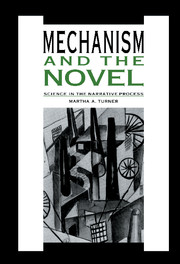Book contents
- Frontmatter
- Contents
- Acknowledgments
- 1 Introduction
- 2 The concept of mechanism
- 3 The Aristotelian logic of settlement in Austen's Pride and Prejudice
- 4 Scott's The Bride of Lammermoor: empiricism, mechanism, imagination
- 5 Cosmology and chaos in Dickens's Bleak House
- 6 Scientific humanism and the Comic Spirit: from The Ordeal of Richard Feverel to The Egoist
- 7 Old mindsets and new world-music in Conrad's The Secret Agent
- 8 Women in Love: beyond fulfillment
- 9 The mechanistic legacy: Lessing's Canopus in Argos: Archives
- Notes
- Bibliography
- Index
2 - The concept of mechanism
Published online by Cambridge University Press: 19 January 2010
- Frontmatter
- Contents
- Acknowledgments
- 1 Introduction
- 2 The concept of mechanism
- 3 The Aristotelian logic of settlement in Austen's Pride and Prejudice
- 4 Scott's The Bride of Lammermoor: empiricism, mechanism, imagination
- 5 Cosmology and chaos in Dickens's Bleak House
- 6 Scientific humanism and the Comic Spirit: from The Ordeal of Richard Feverel to The Egoist
- 7 Old mindsets and new world-music in Conrad's The Secret Agent
- 8 Women in Love: beyond fulfillment
- 9 The mechanistic legacy: Lessing's Canopus in Argos: Archives
- Notes
- Bibliography
- Index
Summary
Classical Mechanics is the name given to the science of Isaac Newton. The seminal Newtonian text is the Principia, which not only gave birth to modern mechanics but also offered the first complete scientific theory of the universe since Aristotle's Physics. Newton replicated some findings of earlier scientists – Galileo, for instance, was the first to claim that motion is more normative than rest (Newton's first law) – but the Principia gave the insights systematic form and provided an appropriate mathematics. As the scientific paradigm grew in prestige during the seventeenth and eighteenth centuries, the word “mechanistic” was applied to a widening range of phenomena and beliefs. Prior to Newton, “mechanics” and “mechanical” had referred only to the operation and maintenance of machines or were associated with manual labor and the working classes generally (as with the “rude mechanicals” in Shakespeare'sA Midsummer Night's Dream). With the emergence of the Newtonian science, however, the words came to apply to any entity or system whose component parts moved regularly and predictably or exhibited other machine-like characteristics. The terms also began at that time to refer to the philosophy we now think of as mechanistic: one that habitually conceptualizes the whole universe as “a system of mutually adapted parts working together … in a manner analogous to mechanical action.” One survey of Western history explains the concept's metaphoric extension thus: “People had long been familiar with such complex machines as watches and clocks. Was it not logical, after Newton, to believe that the universe itself was a grand machine?”
- Type
- Chapter
- Information
- Mechanism and the NovelScience in the Narrative Process, pp. 15 - 42Publisher: Cambridge University PressPrint publication year: 1993

